Value-added Approaches and Practices on the areas of Innovation, Entrepreneurship, and Industry Cooperation of CYCU 中原大學
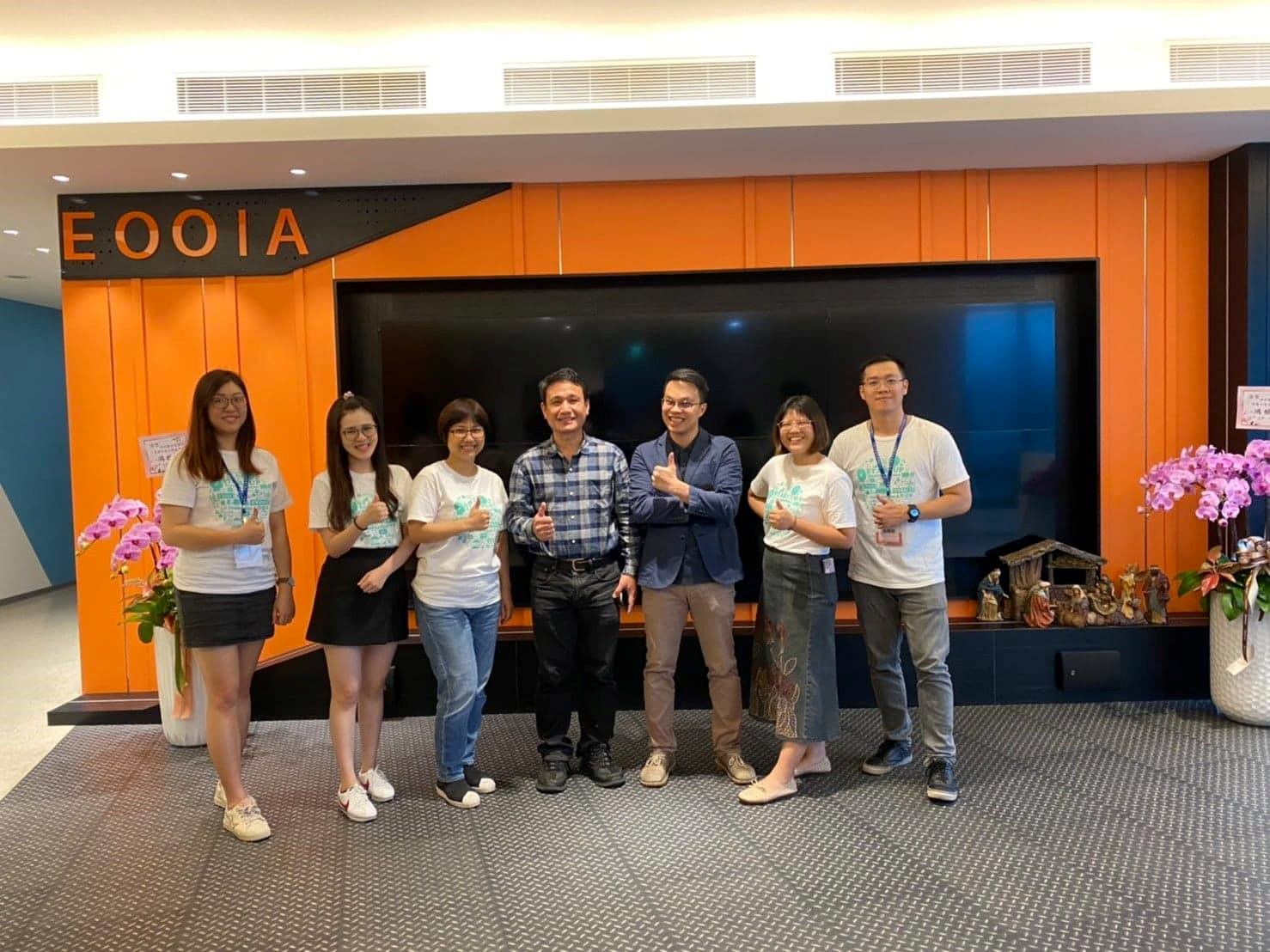
This article presents Chung Yuan Christian University’s中原大學 (CYCU) value-added approaches and practices, specifically, on the areas of innovation, entrepreneurship, and industry cooperation. Innovation is part of its competitive advantage while entrepreneurship and industry cooperation is realized through its developmental objectives. The presentation focuses on the Executive Operation Office for Industry-Academia Cooperation (EOOIAC) of CYCU. It provides the approaches and practices of transforming a campus idea into successful startups. Best approaches suggest that the value-added is the systematic support system to shepherd potential entrepreneurs to have confidence in transitioning ideas into facilitating the need of humanity.
CYCU is a leading integrated private university in Taiwan that traces its roots from its early beginnings in 1953 and 1980 when it became a university. Currently, it offers 38 graduate programs and 13 Ph.D. programs in 29 departments. It produces more than 120,000 alumni and most of them devote their best to the progress of society. Integrating, Creativity, and Innovation are the competitive advantages of CYCU through its development objectives of Holistic Education, Human Concern, and Service Learning.
The Ministry of Education (MOE) has ranked CYCU since 1995 as being the integrated and most prestigious institution of higher education among private universities. Times Higher Education, the data provider that underpins universities’ excellence across the world, ranks CYCU as part of 1001+ World University Rankings 2020; 401-60th Impact Ranking 2020; 251th -300th Asia University Rankings 2019; and part of the top 20 Universities in Taiwan.
The manager of EOOIAC of CYCU, Ms. Linda Chang張詠恰 shared about her unit’s value-added approaches and practices last April 2020. Specifically, in the areas of innovation, entrepreneurship, and industry cooperation. While she is driving the EOOIAC, Mr. Ming-Yen 李明彥 Lee, Ph.D. is providing tactics and strategy as Director of Innovation and Entrepreneurship Development Center (IEDC).
I met Ms. Chang while she promoted the in-campus startups during an international forum in CYCU sometime in October 2019. After that event, I had an opportunity of linking STARTBOARD with her and possible future collaboration and not competition.
Although both CYCU and STARTBOARD are offering almost identical services, I highlighted to her that STARTBOARD is the first that incubates students’ start-ups from ASEAN Countries and India. It is not under any school, university, or government. As an incubator, it has resources that can strengthen incubatees’ performance. It has its law, patent, and marketing business group. As a flexible and versatile incubator, it considers branching out to countries it supported. Currently. it has an office in Thailand.
In November 2019, she provided me a call for startups. I was interested in and submitted my idea. Luckily, my idea was one of the projects that have the potential for innovation and development. Accepted start-up entries included 3 projects of international students from the Philippines, Indonesia, India, and Haiti aside from the majority of its participants from local Taiwanese students and alumni. Start-up proposals were ranging from architecture, IT, farming technologies, and digital apps. Initial screening to clear plagiarism and novelty of ideas was done before the projects were enrolled in the tutoring module. I had the opportunity to attend expert advisory of marketing, general business management, and technology transfer that provided me insights and plans if I will decide to pursue my project.
EOOIAC facilitated rough ideas for its potential innovation and development, product development, and ultimately to become startups. These are enabled through Intelligence Resource and Creativity Integration which composed of value-added module and capability module. Another resource in the international cooperation which implements the tutoring module such as expert advisory, business opportunity, leading technology transfer, venture capitalists match, industrial innovation settlement, international integration counseling, and accelerated development of enterprises. Theoretically, these are just module, what works best is the collaborations and support from 29 departments who have professors that become experts and consultants to these budding potential entrepreneurs. Likewise, the different centers such as Innovation and Entrepreneurship, Cooperation & Technology Licensing, Industrial Accelerator & Incubation, and Industrial Liaison are specialized to facilitate the developmental needs of the project transformation to become startups.
The schematic diagram below summarizes the whole process;
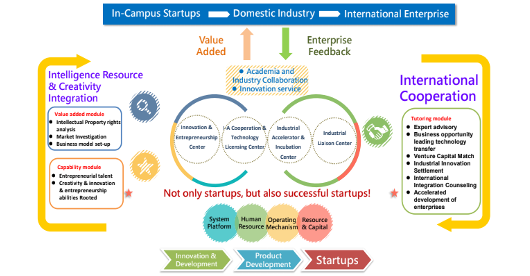
From laboratory to startup is promoted through its campus entrepreneurship mechanism for professors. Each professor will do the original technology screening and background surveys of projects. The initial survey results will become R&D results exploration which the technology managers/ mentors / coaches will include in the finalists of campus startups projects for a subsidy (business case and developing planning of prototype technology /products). These will be subjected to evaluation, product validation, permission, sales, and promotion. After business model evaluation and planning, the projects will undergo the post-germination stage which finalizes the technology and products of which regulations for university spin-off for going to business and industry will be facilitated.
Campus entrepreneurship promotion has a student version. It covers high school students that capacitated CYCU’s general education courses, interdisciplinary program of Creation, Innovation, and Entrepreneurship courses (CIE), and creative classroom. These include advanced training modules (thinking and creativity, the idea to patent, innovative technology, social entrepreneurship); Practice curriculum modules (entrepreneurship plan, field trips, among others); Competition; and Coaching. Over 30 Intl. students from China, Indonesia, Japan, Korea, Philippines, and USA joint IIELE. The CIE courses and advanced campus startup are presented through a schematic diagram below:
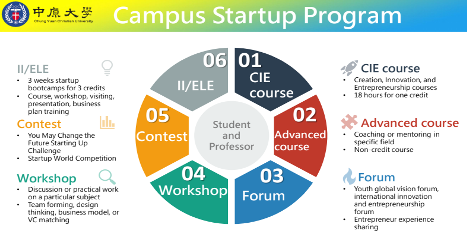
Furthermore, EOOIAC offers the “You may change the future” a starting up the challenge. It is implemented every November that includes 4 categories such as intelligence technology, social practice, industry innovation, and reality technology. So far, more than 300 students from 55 universities signed up for a total of 128 teams that participated.
CYCU assists total incubators that cover in pre-incubation, incubation, and post-incubation. Its general services include space (independent office, co-working, meeting room); R&D; Funding (applications through government and angel fund matching); Business Services (Accounting, Finance, Patent); Consulting; and Equipment (R&D center experiment). While its value added services deal with exclusive coach, customized counseling, cross-industry interaction, coaching resume system, and online tutoring program.
CYCU Ranks first in Business Incubation Capacity in Asia-Pacific as reported on its website http://www.cycu.edu.tw/eng last December of 2019. CYCU incubated more than 203 companies; over NT$ 3.1billion invested capital; and 8 IPO listed companies. Featured companies include PuriBlood which develops leukoreduction filtration, founded by Professor Yung Chung-director of CYCU R&D Center for Membrane Technology; Rice Ear Corp’s photocatalyst air purifier, which is helped by TYCommander that won Taiwan Excellence Awards with its; Smart Manufacturing in collaboration with Servtech who has owned shares with Foxconn Technology Group. Some of those successful enterprises are listed below:
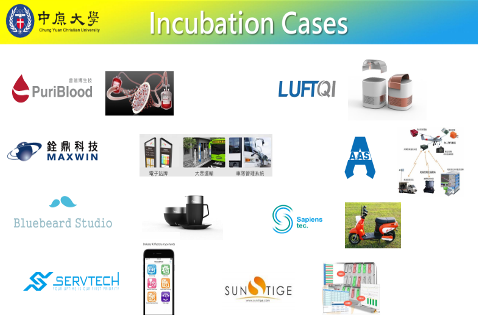
CYCU aligns well in facilitating the international community on the areas of innovation, entrepreneurship, and industry cooperation as it’s Global Research and Industry Alliance (GLORIA) in cooperation with the Ministry of Science and Technology (MOST) connects with the global market. It aims of advanced technology fields that focus on university-based research, building a platform of the industry- academia-research cooperation through providing talents and scientific research services for the industry. Its two main fields are Membrane Technology and Smart Manufacturing (which covers environmental protection, green energy, biomedicine, and integrated circuit design). Aside from MOST, CYCU also receives projects from MOE (Southbound projects), MOEA, and Taoyuan City Government.
Indeed, the EOOIAC of CYCU provides a framework of systematic support system to shepherd potential university’s international or local Taiwanese entrepreneurs to have confidence in transitioning ideas into facilitating the need of humanity.
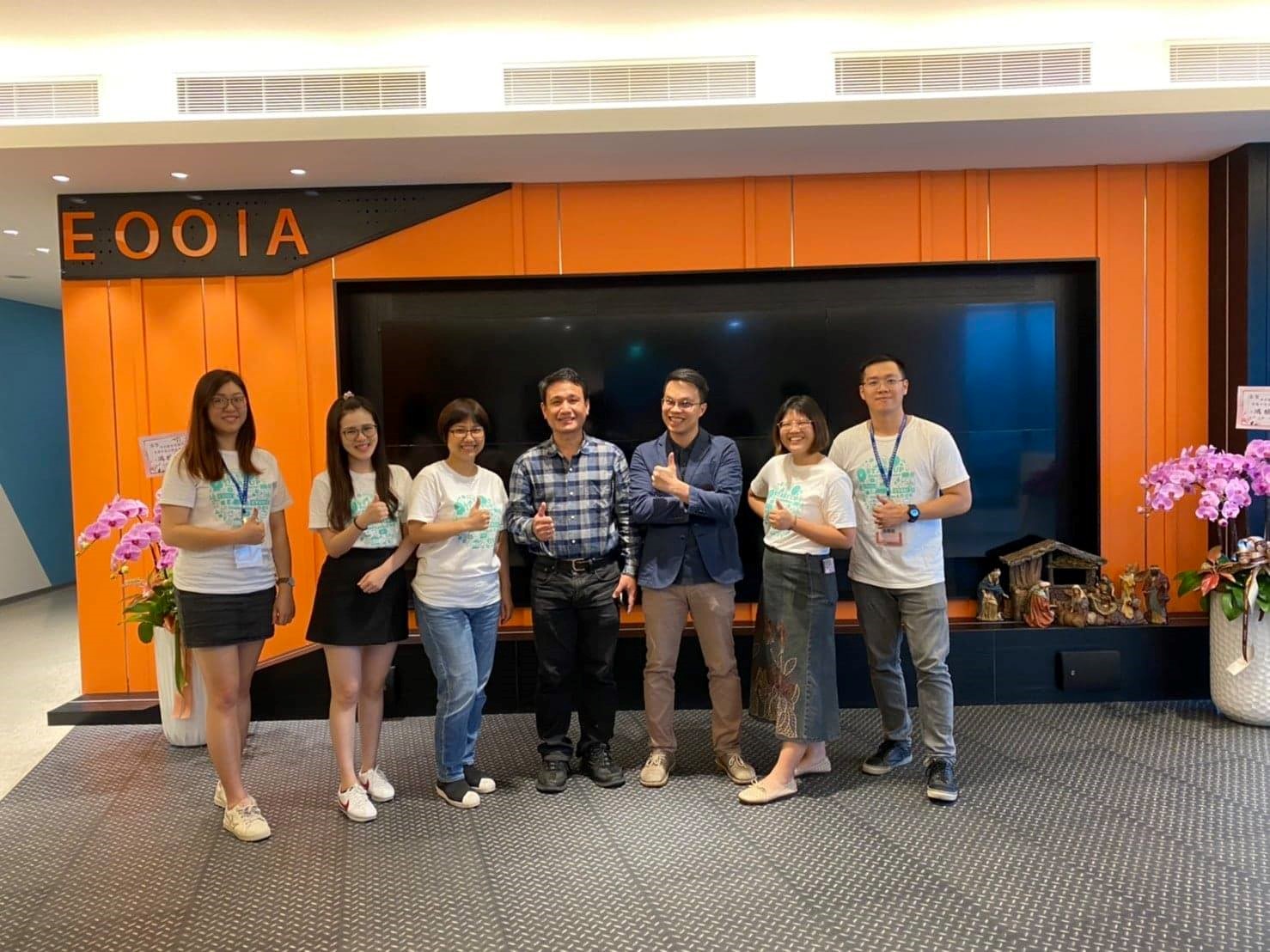
On the middle is STARTBOARD correspondent, Mr. Challoner A. Matero 陳洛文; on his right is Ms. Linda Chang 張詠恰, EOOIAC manager; on his left is Mr. Ming-Yen 李明彥 Lee, Ph.D. IEDC Director; and together with EOOIA staff.
STARTBOARD Founder / CEO Uniform Zhi-Fu Lin